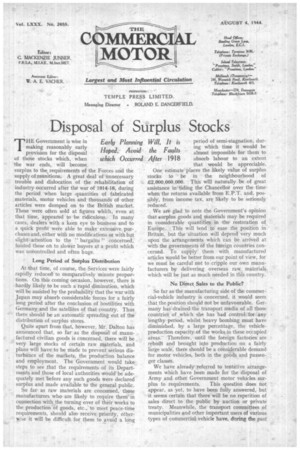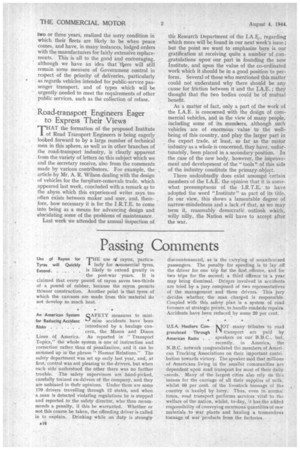Disposal of Surplus Stocks
Page 17

Page 18

If you've noticed an error in this article please click here to report it so we can fix it.
Early Planning Hoped, Avoid which Occurred
THE Government is wise in making reasonably early provision for the disposal of those stocks which, when the war ends, will become surplus to the, requirements of the Forces and the supply of munitions. A great deal of unnecessary trouble and dislocation of the rehabilitation of industry occurred after the war of 1914-18, during the period when large quantities of fabricated materials, motor vehicles and thousands of other articles were dumped on to the British market. These were often sold at figures which, even at that time, appeared to be ridiculous. In many cases, dealers with a keen eye to business and to a quick profit were able to make extensive purchases and, either with no modifications or with but slight attention to the " bargains " concerned, foisted these on to slower buyers at a profit which was uncontrolled and often huge.
Long Period of Surplus Distribution At that time, of course, the Services were fairly rapidly reduced to comparatively minute proportions. On this coming occasion, however, there is hardly likely to be such a rapid diminution, which will be assisted by the probability that the war with • Japan may absorb considerable forces for a fairly long period after the conclusion of hostilities with Germany and the satellites of that country. Thus • there should be an automatic spreading out of the distribution of surplus stores.
Quite apart from that, however, Mr. Dalton has announced that, so far as the disposal of manufactured civilian goods is concerned, there will be very large stocks of certain raw materials, and plans will have to be made to prevent serious disturbance of the markets, the production balance and employment. The Government would take steps to see that the requirements of its Departments and those of local authorities would be adequately met before any such goods were declared surplus and made available to the general public. So far as raw materials are concerned, those manufacturers who are likely to require them'in connection with the turning over of their works to the production of goods, etc., to meet peace-time requirements, should also receive priority, otherwise it will be difficult for them to avoid a long period of semi-stagnation, during which time it would be almost impossible for them to 1918 absorb labour to an extent that would be appreciable.
One estimate places the likely value of surplus stocks to be in the neighbourhood of £2,000,000,000. This will naturally be of great assistance in tiding the Chancellor over the time when the returns available from E.P.T. and, possibly, from income tax, are likely to be seriously reduced.
We are glad to note the Government's opinion that €urplus goods and materials may be required in considerable quantities in the restoration of Europe. This will tend to ease the position in Britain, but the situation will depend very much upon the arrangements which can be arrived at with the governments of the foreign countries concerned. To supply them with manufactured articles would be better from our point of view, for we must be careful not to cripple our own manufacturers by delivering overseas raw materials which will be just as much needed in this country.
No Direct Sales to the Public?
So far as the manufacturing side of the commercial-vehicle industry is concerned, it would seem that the position should not be unfavourable. Germany has drained the transport media of all those countries of which she has had control for any lengthy period, whilst heavy bombing must have diminished, by a large percentage, the vehicleproduction capacity of the works in these occupied areas. Therefore, until the foreign factories are rebuilt and brought into production on a fairly large scale, there should be a considerable demand for motor vehicles; both in the goods and passenger classes.
We have already referred to tentative arrangements which have been made for the disposal of Army and other Government motor vehicles sur plus to requirements. This question does not appear, as yet, to have been fully answered, but it seems certain that there will be no repetition of sales direct to the public by auction or private treaty. Meanwhile, the transport committees of municipalities and other important users of various types of commercial vehicle have, during the past two or three years, realized the sorry condition in which their fleets are likely to be when peace comes, and have, in many initances, lodged orders with the manufacturers for fairly extensive replacements. This is all to the good and encouraging, although we have an idea that tbere will still remain some measure of Government control in respect of the priority of deliveries, particularly as regards vehicles intended for public-service passenger transport, and of types which will be urgently needed to meet the requirements of other public services, such as the collection of refuse.
Road-transport Engineers Eager to Express Their Views THAT the formation of the proposed Institute of Road Transport Engineers is being eagerly looked forward to by a large number of technical men in this sphere, as well as in other branches of the road-transport industry, is clearly apparent from the variety of letters on this subject which we and the secretary receive, also from the comments made by various contributors. For example, the article by Mr. A. R. Wilson dealing with the design of vehicles for the furniture-removals trade, which appeared last week, concluded with a remark as to the abyss which this experienced writer says too often exists between maker and user, and, there, fore, how necessary it is for the I.R.T.E. to come into being as a means for advancing design and elucidating some of the problems of maintenance. Last week we attended the annual inspection of the Research Department of the I.A.E.., regarding which more will be found in our next week's issue; but the point we want to emphasize here is our gratification at receiving quite a number of congratulations upon our part in founding the new Institute, and upon the value of the co-ordinated work which it should be in a good position to perform. Several of those who mentioned this matter could not understand why there should be any cause for friction between it and the I.A.E.; they thought that the two bodies could be of mutual benefit. As a matter of fact, only a part of the work of the I.A.E. is concerned with the design of commercial vehicles, and in the view of many people, including some of its members, although such vehicles are of enormous value to the wellbeing of this country, and play the larger part in the export trade, at least, so far as the motor industry as a whole is concerned, they have, unfortunately, been placed in a secondary position. In the case of the new body, however, the improvement and development of the "tools" of this side of the industry constitute the primary object. There undoubtedly does exist amongst 'certain members of the I.A.E. the opinion that it is somewhat presumptuous of the I.R.T.E. to have adopted the word "Institute" as part of its title. In our view, this shows a lamentable degree of narrow-mindedness and a lack of that, as we may term it, reasonably democratiC outlook which, willy nilly, the Nation will have to accept after the war.




















































